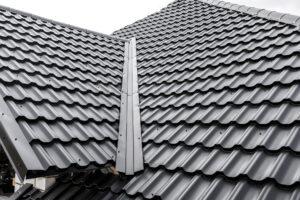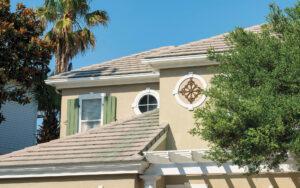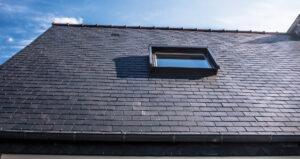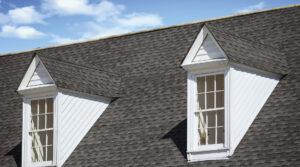Living in Florida means enjoying sunny beaches and warm weather, but it also means preparing your home for intense heat, high humidity, torrential rains, and hurricanes. Your roof is your home’s first line of defense against these elements, and selecting the right roofing shingles is critical for durability, energy efficiency, and long-term protection. This guide explores four types of roofing shingles suitable for Florida residents—asphalt, metal, composite, and slate—detailing their pros, cons, maintenance needs, and when to call a professional. We’ll also consider Florida’s unique climate challenges to help you make an informed decision.
 Asphalt Shingles: Affordable and Common
Asphalt Shingles: Affordable and Common
Asphalt shingles are the most popular roofing material in Florida due to their affordability and versatility. These shingles consist of a fiberglass or organic mat coated with asphalt and topped with ceramic granules for UV protection. They come in various styles, including three-tab and architectural, with the latter being thicker and more durable.
Pros: Asphalt shingles are budget-friendly, with costs ranging from $3 to $7 per square foot installed. They’re widely available, easy to install, and come in a range of colors to match Florida’s vibrant aesthetic. Architectural asphalt shingles often carry wind resistance ratings up to 130 mph, making them suitable for hurricane-prone areas when properly installed.
Cons: Asphalt shingles have a shorter lifespan (15–30 years) compared to other materials, especially in Florida’s harsh climate, where UV rays and humidity accelerate wear. They’re less energy-efficient, absorbing heat and increasing cooling costs. Low-quality options may not withstand severe storms, leading to granule loss or cracking.
Maintenance: Inspect asphalt roofs annually for missing granules, cracks, or curling shingles. Clean debris from gutters to prevent water pooling, which can exacerbate leaks. After storms, check for damage, as even minor issues can worsen under Florida’s relentless weather. Replace damaged shingles promptly to avoid costly repairs.
When to Call a Professional: If you notice widespread granule loss, multiple missing shingles, or signs of leaks (e.g., water stains on ceilings), contact a licensed roofer. Professionals can assess whether repairs or a full replacement are needed, especially if your roof is nearing the end of its lifespan.
 Metal Shingles: Durable and Weather-Resistant
Metal Shingles: Durable and Weather-Resistant
Metal shingles, typically made from aluminum, steel, or copper, are gaining popularity in Florida for their durability and resilience. They mimic the look of traditional shingles while offering superior performance against extreme weather.
Pros: Metal shingles are highly durable, lasting 40–70 years with proper maintenance. They’re resistant to wind speeds up to 140 mph, making them ideal for hurricanes. Metal reflects heat, reducing cooling costs by up to 25%. They’re also fire-resistant and impervious to rot, mold, and pests, which thrive in Florida’s humid climate.
Cons: Metal shingles are more expensive, costing $7–$18 per square foot installed. They can be noisy during heavy rain unless paired with proper insulation. Coastal homeowners must ensure corrosion-resistant coatings (e.g., galvanized or aluminized steel) to combat salt spray.
Maintenance: Rinse metal roofs periodically to remove salt and debris, especially in coastal areas. Check for scratches or dents that could compromise protective coatings. Ensure fasteners and seams remain tight to prevent leaks during high winds.
When to Call a Professional: If you notice rust, loose fasteners, or significant dents after a storm, hire a roofer to repair or recoat the affected areas. Professionals can also evaluate whether your metal roof meets Florida’s stringent building codes for wind resistance.
 Composite Shingles: Eco-Friendly and Versatile
Composite Shingles: Eco-Friendly and Versatile
Composite shingles, made from recycled plastics, rubber, or polymers, offer a modern alternative that balances aesthetics and performance. They’re engineered to resemble natural materials like slate while providing enhanced durability.
Pros: Composite shingles are lightweight, impact-resistant, and rated for winds up to 110–130 mph, suitable for Florida’s stormy weather. They resist mold, algae, and UV damage, maintaining their appearance in humid conditions. Many are eco-friendly, made from recycled materials, and can last 30–50 years.
Cons: Composite shingles cost $7–$12 per square foot, higher than asphalt but lower than slate. They’re less common, so finding experienced installers in Florida may be challenging. Color options are diverse but may fade slightly over time under intense sunlight.
Maintenance: Clean composite roofs annually to remove dirt and algae, using a low-pressure wash to avoid damaging the surface. Inspect for cracked or loose shingles after storms, as even durable materials can sustain impact damage from debris.
When to Call a Professional: If you notice significant fading, cracking, or lifting shingles, consult a roofer to assess repair needs. Professionals can also ensure proper installation, as composite shingles require specific techniques to maximize longevity.
 Slate Shingles: Premium and Long-Lasting
Slate Shingles: Premium and Long-Lasting
Slate shingles, crafted from natural stone, are a premium option for Florida homeowners seeking elegance and longevity. They’re less common but highly effective in upscale neighborhoods or historic homes.
Pros: Slate shingles are exceptionally durable, lasting 75–100 years or more. They’re fire-resistant, impervious to mold, and highly wind-resistant, making them suitable for Florida’s climate. Slate’s natural beauty enhances curb appeal, and its thermal properties reduce heat gain.
Cons: Slate is expensive, costing $15–$30 per square foot installed, and requires a reinforced roof structure due to its weight. Installation is labor-intensive, and repairs can be costly if individual shingles crack. Availability of skilled slate roofers in Florida may be limited.
Maintenance: Inspect slate roofs annually for cracked or missing shingles, especially after hurricanes. Remove debris carefully to avoid dislodging tiles. Ensure flashing around chimneys and vents remains intact to prevent leaks.
When to Call a Professional: Cracked or displaced slate shingles require expert repair to maintain waterproofing. If your roof shows signs of structural stress (e.g., sagging), a professional must evaluate whether the framework can continue supporting the slate’s weight.
 Florida’s Climate Considerations
Florida’s Climate Considerations
Florida’s climate poses unique challenges for roofing shingles. Hurricanes bring high winds and flying debris, requiring materials that meet Miami-Dade County’s strict wind resistance standards (e.g., 150 mph for Category 5 storms). Intense UV radiation fades colors and degrades materials, while humidity fosters mold and algae growth. Heavy rains test waterproofing, and coastal salt spray accelerates corrosion. Choose shingles with high wind ratings, UV-resistant coatings, and mold inhibitors. Ensure proper installation by a licensed contractor familiar with Florida’s building codes, as poor workmanship can void warranties and reduce lifespan.
Regular maintenance is crucial in Florida. Schedule annual inspections, clean roofs and gutters, and address minor issues promptly to prevent costly damage. After major storms, hire a professional to assess hidden damage, as insurance claims often require detailed documentation. Investing in quality shingles and proactive care can save thousands in repairs and replacements. ![]()
Alan Lashbrook
Choosing the Best Roofing Shingles for Florida Homes
For Florida homeowners looking to extend the life of their asphalt shingle roofs without the expense of a full replacement, Roof Maxx offers an innovative solution. Founded by brothers Mike and Todd Feazel, Roof Maxx uses a plant-based, soy methyl ester emulsion to rejuvenate aging shingles. This eco-friendly treatment, developed with Battelle Laboratories, restores the flexibility and waterproofing capabilities of asphalt shingles by replenishing lost oils. Applied as a spray, it penetrates shingles, making them more pliable and resistant to cracking under Florida’s extreme weather conditions. A single treatment can add up to five years of life to a roof, with regular applications potentially extending its lifespan by 15 years. Roof Maxx is safe for people, pets, and the environment, and comes with a five-year transferable warranty. With a network of certified dealers across Florida, Roof Maxx provides a sustainable, proven option for preserving asphalt roofs in the Sunshine State.









